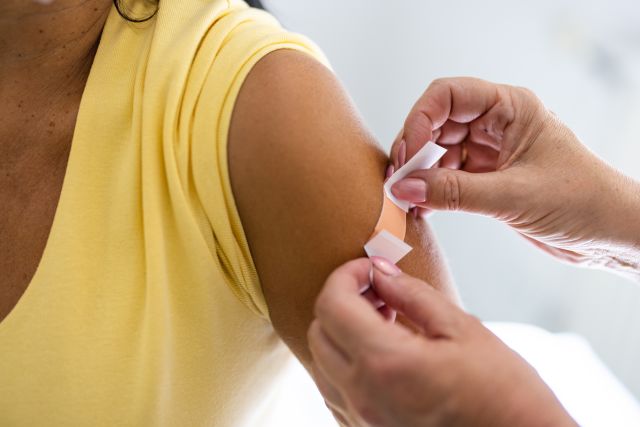Updated on March 14, 2024
Since the first COVID-19 vaccines became available at the end of 2020, millions of Americans have received several doses of the vaccines—including boosters and updated versions—to help protect themselves from the highly contagious virus.
The vaccines do not provide 100 percent protection against becoming infected with the virus. In fact, no vaccine is 100 percent effective. But people who are up-to-date on their vaccinations are better protected from serious illness than those who are unvaccinated. They also have a lower risk of spreading COVID-19 to other people.
According to the Centers for Disease Control and Prevention (CDC), being up-to-date means that a person aged 6 months to 64 years has received at least one dose of an updated COVID-19 vaccine. For people ages 65 and up, that means receiving two updated COVID-19 vaccine doses.
Each of the major vaccine manufacturers—Novavax, Pfizer-BioNTech, and Moderna—released updated vaccines for 2023-2024 in the fall of 2023. (The original COVID vaccines produced by Pfizer, Moderna, and J&J Janssen are no longer available for use in the United States, nor are the bivalent vaccines released by Pfizer and Moderna for 2022-2023.)
How the COVID-19 vaccine protects you
Here’s a look at the outcomes that a COVID vaccine helps prevent:
Death: People who are fully vaccinated are at a much lower risk of dying from COVID-19 than people who are unvaccinated.
Serious illness: The vaccines protect against serious illness from COVID-19. That includes the kind of symptoms and complications that can put a person in the hospital, requiring intensive care and a ventilator. It can be difficult to predict who will experience serious illness.
Adults over the age of 65 and those with existing health issues are most at risk for serious illness. (Those issues may include cancer, chronic lung disease, diabetes, and a compromised immune system.) But COVID-19 has also led to hospitalizations and death in younger and middle-aged people who are otherwise healthy.
Moderate illness: Moderate illness refers to a COVID-19 infection that doesn’t require hospitalization but is still significant. You may experience dehydration, fever, shortness of breath, and other symptoms. These symptoms can last weeks. It is more common for people who have been vaccinated to experience mild symptoms, which tend to feel more like those of a common cold.
Long COVID: A minority of people diagnosed with COVID-19 will experience post-COVID symptoms, also known as "long COVID." Estimates for how many people get long COVID range from 5 to 25 percent of people who had COVID-19. Symptoms can include difficulty breathing, chest pain, fatigue, and loss of taste or smell. These issues can persist six months or longer after recovering from the virus. By preventing COVID in the first place, vaccines can help people avoid these complications.
Spreading COVID: In addition to protecting yourself, the vaccine can help prevent you from passing COVID on to others. Researchers have found that even when vaccinated people do contract COVID, they spread the virus for a shorter period of time than those who are not vaccinated.
Even if you’ve had COVID-19 before, it’s important to get a vaccine. It gives you added protection against getting the virus again.
Talk to your healthcare provider
If you have more questions about the vaccine or are unsure which COVID-19 vaccine to get, your best source of information is a healthcare provider. The vaccine is free and readily available at pharmacies and other locations. To find a COVID-19 vaccine location near you, visit vaccines.gov.






